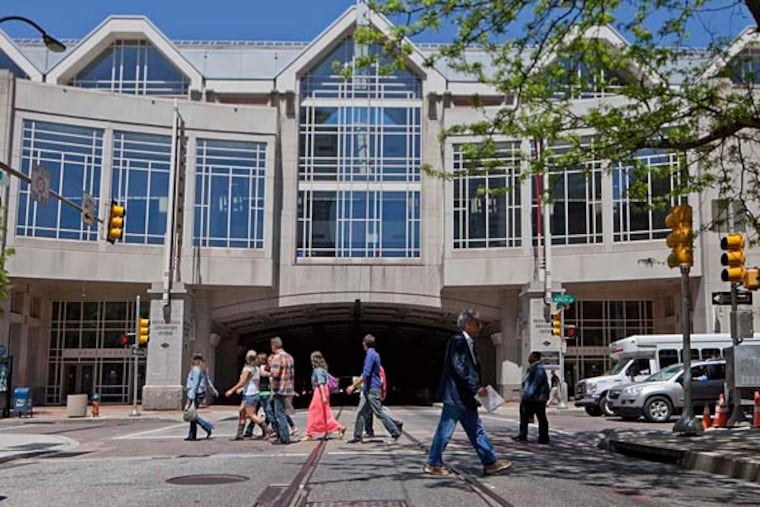Conventions in Philly brace for possible labor protests
A three-minute video for the 11th annual World Congress on Industrial Biotechnology, which kicks off Monday at the Convention Center, boasts of potential networking opportunities, "robust break-out sessions," and exciting luncheons.

A three-minute video for the 11th annual World Congress on Industrial Biotechnology, which kicks off Monday at the Convention Center, boasts of potential networking opportunities, "robust break-out sessions," and exciting luncheons.
But the big question hanging over the event Sunday seemed to be whether the 1,100 attendees paying $850 to $1,275 will get a robust introduction to Philadelphia labor activism.
Two unions, Carpenters Local 8 and Teamsters Local 107, were locked out last week after failing to agree in a timely manner to new work rules and lost their convention jobs to other unions.
John McNichol, the Convention Center's chief executive officer, said if there are protests Monday, he expects them to be civil. He added that the center had a well-trained security team.
Registration for the industrial biotech congress opens Monday. The event runs through Thursday.
McNichol said reforming the work rules would eventually help repair the Convention Center's reputation and make it a more appealing destination for major gatherings.
"People come here, and they love our city, they love our restaurants, they love our walkable streets," McNichol said. "The problem is the [labor] cost and the hassle."
He said unions were not to blame for all the complaints at center, citing management problems last year, too. But taking on labor costs sends a message that the Convention Center is prepared to evolve in order to attract more business, he said.
"We're taking seriously the reputation Philadelphia has," McNichol said. "It's why we're going through this. We're going to change the perception of Philadelphia."
Representatives of the Carpenters and Teamsters did not return calls for comment Sunday. Earlier, the Carpenters issued a statement that said: "The Carpenters will do what is necessary to right this wrong and stand up for their members."
The two locals belatedly agreed to the new work rules on Friday, but Convention Center management rebuffed them. Officials said the unions missed a May 5 deadline to accept the changes and said they would not revisit the issue.
The unions contend they were misled about the deadline, which center management said was not so.
As a result, the Carpenters and Teamsters' work will be divided among the unions that agreed to the new rules - Laborers Local 332, Electrical Workers Local 98, Stagehands Local 8, and Iron Workers 405.
The center, which completed a $780 million expansion in 2011, has not met its financial expectations. The expansion was supposed to help it draw up to 30 major conventions a year, but fewer than half that have been scheduled per year through 2017.
Among the new rules is one that will allow exhibitors to set up booths (up to 600 square feet, double the present limit) with their own full-time employees instead of the center's union workers. Another rule institutes a standard drug-testing program for union workers.
"People are turning their backs on us because we're not competitive with other facilities," McNichol said. "Now's the time to move forward. We have no choice."
In bustling Reading Terminal Market, which draws heavily from visitors to the neighboring Convention Center, vendors were watching the labor dispute closely.
Rebecca Foxman, manager at Valley Shepherd Creamery, said groups would not come to Philadelphia if they thought their meetings would be disrupted.
"That's not good from a tourism and hospitality standpoint," said Foxman, former manager of a hotel food and beverage division. "Any type of conflict is not good for the image of the city."
Glenn Mueller, owner of Chocolate by Mueller at the market, acknowledged the importance of conference attendees to his customer base.
"Conventions are supposed to be fun," he said, peering out from behind a row of rock candy lollipop jars.
Meanwhile, arriving conventioneers said they were preparing for the event. Some were unaware of the dispute, but they said protests would not impede the conference.
"I can't afford to not go through," said Junior Te'o, a 48-year-old associate professor from the Queensland University of Technology in Brisbane, Australia. "I've come all this way."
610-313-8113
Inquirer staff writer Joseph N. DiStefano contributed to this article.